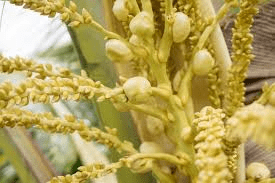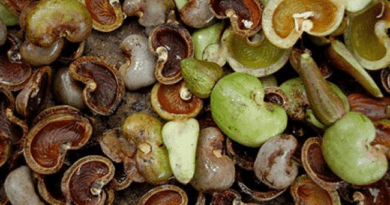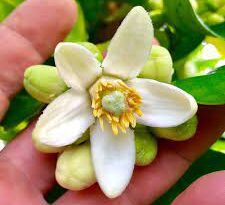The Coconut Flowers: Economic Importance, Uses, and By-Products
Coconut flowers are an important part of the coconut tree. These flowers are also known as coconut inflorescence and are the reproductive part of the coconut tree. They are used for various purposes, ranging from food to medicine to decoration. The coconut tree produces flowers throughout the year, with each inflorescence containing both male and female flowers.
The male flowers are located at the top of the inflorescence, while the female flowers are located at the bottom. The male flowers produce pollen, which is carried by bees and other insects to the female flowers for pollination. Once pollinated, the female flowers develop into coconuts.
The coconut flowers have a unique structure that distinguishes them from other flowers. The inflorescence is made up of a central axis, from which emerge numerous flower branches. Each flower branch contains a group of flowers, with the male flowers located at the top and the female flowers at the bottom.
Coconut flowers have a sweet nectar that is used to produce coconut sugar and coconut syrup. These sweeteners are a healthier alternative to refined sugar and are used in a variety of dishes, including desserts and baked goods.
In addition to their use as a sweetener, coconut flowers have medicinal properties. The nectar of the coconut flowers is believed to have antiviral, antibacterial, and anti-inflammatory properties. It is also believed to help regulate blood sugar levels, making it beneficial for people with diabetes.
Coconut flowers are also used for decorative purposes. The inflorescence can be used to create beautiful floral arrangements or to adorn traditional costumes during cultural festivals.
Overall, coconut flowers are a valuable resource that provides a range of economic benefits. From food to medicine to decoration, these flowers play an important role in many aspects of life.
The Products and By-products That Can Be Derived From Coconut Flowers

1. Culinary Ingredients: Coconut flowers can be used as culinary ingredients in various dishes, adding a unique flavor and texture. They can be incorporated into salads, stir-fries, curries, and desserts.
2. Herbal Teas: Infusions or teas made from coconut flowers are consumed for their health benefits, including hydration, detoxification, and immune support. They are rich in vitamins, minerals, and antioxidants.
3. Perfume Ingredients: Fragrant extracts and essential oils derived from coconut flowers are used in perfumery and aromatherapy. They add a tropical scent to perfumes, lotions, and candles.
4. Decorative Garnishes: Coconut flowers are used as decorative garnishes for culinary presentations, enhancing the visual appeal of dishes. They are often used to embellish desserts, cocktails, and gourmet creations.
5. Traditional Medicine: Coconut flowers are utilized in traditional medicine systems for their medicinal properties and therapeutic benefits. They are believed to have antioxidant, anti-inflammatory, and antimicrobial properties.
6. Crafts and Artwork: Coconut flowers are incorporated into traditional crafts such as garlands, wreaths, and ornaments. They are woven or strung together to create decorative items for ceremonies and festivals.
7. Bee Attraction: Coconut flowers attract bees and other pollinators, making coconut plantations ideal locations for beekeeping activities. Beekeepers harvest honey from beehives located near coconut palms.
8. Landscaping: Coconut flowers enhance the aesthetic appeal of landscapes and gardens when planted as ornamental trees. Their tall, graceful stems and clusters of flowers add beauty and tropical flair to outdoor spaces.
9. Fodder for Livestock: Coconut flowers and inflorescence stalks are fed to livestock such as goats, cattle, and poultry as fodder. They provide a nutritious feed supplement rich in protein and vitamins.
10. Organic Fertilizer: Extracts or infusions of coconut flowers are used as organic fertilizers to enrich soil fertility and promote plant growth. They contain essential nutrients that nourish plants and improve soil structure.
11. Cosmetic Ingredients: Coconut flower extracts are used in cosmetic formulations such as shampoos, conditioners, and skincare products. They provide moisturizing, nourishing, and soothing properties for hair and skin care.
12. Natural Dyes: Coconut flowers are sources of natural dyes used in textiles and crafts. The pigments extracted from flowers are used to dye fabrics, yarns, and handicrafts in vibrant shades.
13. Cultural Symbols: Coconut flowers have cultural significance in many societies, where they are used in rituals, ceremonies, and religious offerings. They symbolize purity, fertility, and prosperity, and are associated with love and beauty.
14. Traditional Crafts: Coconut flowers are crafted into decorative items, sculptures, and artwork by skilled artisans. They are carved, shaped, and polished to create unique and intricate designs.
15. Traditional Rituals: Coconut flowers are used in traditional rituals and ceremonies, symbolizing auspiciousness, blessings, and good fortune. They are offered as religious offerings and used in cultural events.
16. Land Reclamation: Coconut flowers contribute to land reclamation efforts by stabilizing soil in coastal areas and wetlands. Their roots bind soil particles together, preventing erosion and promoting vegetation growth.
17. Erosion Control: Coconut flowers are used in erosion control measures such as slope stabilization and riverbank reinforcement. Their dense root systems help anchor soil and prevent erosion in vulnerable areas.
Read Also: 10 Medicinal Health Benefits Of Jakhya (Cleoma viscosa)
The Economic Importance and Uses of Coconut Flowers

1. Pollination: Coconut flowers play a crucial role in the pollination process, facilitating the reproduction of coconut palms. Pollination leads to the formation of coconuts, which are harvested for various purposes.
2. Coconut Production: Coconut flowers are the precursors to coconut fruits, which are a valuable source of food, oil, and fiber. The successful pollination and development of flowers contribute to coconut production, supporting livelihoods and economies in coconut-growing regions.
3. Culinary Use: Coconut flowers are edible and used in various culinary preparations in tropical cuisines. They can be added to salads, stir-fries, curries, and desserts for flavor and nutritional value.
4. Traditional Medicine: In traditional medicine systems, coconut flowers are used for their medicinal properties and therapeutic benefits. They are believed to have antioxidant, anti-inflammatory, and antimicrobial properties, and are used to prepare herbal remedies for ailments such as coughs, colds, and digestive disorders.
5. Herbal Teas: Coconut flower infusions or teas are consumed for their health benefits, including hydration, detoxification, and immune support. They are rich in vitamins, minerals, and antioxidants, making them a popular beverage choice in some cultures.
6. Ornamental Purposes: Coconut flowers are used as decorative elements in floral arrangements, ceremonies, and cultural events. Their unique appearance and tropical charm make them popular choices for decorating homes, temples, and special occasions.
7. Perfumery: Coconut flowers produce a fragrant scent that is used in perfumery and aromatherapy. Extracts and essential oils derived from coconut flowers are used as fragrance ingredients in perfumes, lotions, and candles.
8. Traditional Crafts: Coconut flowers are incorporated into traditional crafts such as garlands, wreaths, and ornaments. They are woven or strung together to create decorative items for religious ceremonies, weddings, and festivals.
9. Beekeeping: Coconut flowers attract bees and other pollinators, making coconut plantations ideal locations for beekeeping activities. Beekeepers harvest honey from beehives located near coconut palms, contributing to honey production and pollination services.
10. Landscaping: Coconut flowers enhance the aesthetic appeal of landscapes and gardens when planted as ornamental trees. Their tall, graceful stems and clusters of flowers add beauty and tropical flair to outdoor spaces.
11. Traditional Rituals: Coconut flowers are used in traditional rituals, ceremonies, and religious offerings in many cultures. They symbolize purity, fertility, and prosperity, and are often used in auspicious occasions and rites of passage.
12. Folklore and Symbolism: Coconut flowers feature prominently in folklore, myths, and cultural symbols across various cultures and traditions. They are associated with love, beauty, and resilience, inspiring stories, poems, and art forms.
13. Fodder for Livestock: Coconut flowers and inflorescence stalks are fed to livestock such as goats, cattle, and poultry as fodder. They provide a nutritious feed supplement rich in protein, carbohydrates, and vitamins for animal health and productivity.
14. Organic Fertilizer: Coconut flower extracts or infusions are used as organic fertilizers to enrich soil fertility and promote plant growth. They contain essential nutrients and trace elements that nourish plants and improve soil structure.
15. Cosmetic Ingredients: Extracts and infusions of coconut flowers are used in cosmetic formulations such as shampoos, conditioners, and skincare products. They provide moisturizing, nourishing, and soothing properties for hair and skin care.
16. Natural Dyes: Coconut flowers are sources of natural dyes used in textiles and crafts. The pigments extracted from flowers are used to dye fabrics, yarns, and handicrafts in vibrant shades of pink, purple, and yellow.
17. Culinary Garnish: Coconut flowers are used as decorative garnishes for culinary presentations, adding visual appeal and sophistication to dishes. They are often used to embellish desserts, cocktails, and gourmet creations.
Read Also: How to Control Feeding Struggle among Fishes in the same Pond
Frequently Asked Questions (FAQs) About Coconut Flowers

1. Can you eat coconut flowers?
Yes, coconut flowers are edible and used in various culinary preparations in tropical cuisines. They can be added to salads, stir-fries, curries, and desserts for flavor and nutritional value.
2. Are coconut flowers used in traditional medicine?
Yes, coconut flowers are used in traditional medicine systems for their medicinal properties and therapeutic benefits. They are believed to have antioxidant, anti-inflammatory, and antimicrobial properties, and are used to prepare herbal remedies for various ailments.
3. How are coconut flowers used in perfumery?
Coconut flowers produce a fragrant scent that is used in perfumery and aromatherapy. Extracts and essential oils derived from coconut flowers are used as fragrance ingredients in perfumes, lotions, and candles.
4. What are some traditional uses of coconut flowers?
Coconut flowers are traditionally used in culinary preparations, herbal teas, ornamental decorations, perfumery, beekeeping, and traditional rituals. They are also incorporated into crafts, folklore, and cultural symbols.
5. Are coconut flowers used as animal feed?
Yes, coconut flowers and inflorescence stalks are fed to livestock such as goats, cattle, and poultry as fodder. They provide a nutritious feed supplement rich in protein, carbohydrates, and vitamins for animal health and productivity.
6. Can coconut flower extracts be used as fertilizers?
Yes, extracts and infusions of coconut flowers are used as organic fertilizers to enrich soil fertility and promote plant growth. They contain essential nutrients and trace elements that nourish plants and improve soil structure.
7. Are coconut flowers used in cosmetic products?
Yes, extracts and infusions of coconut flowers are used in cosmetic formulations such as shampoos, conditioners, and skincare products. They provide moisturizing, nourishing, and soothing properties for hair and skin care.
8. What do coconut flowers symbolize in different cultures?
Coconut flowers symbolize purity, fertility, prosperity, and tropical beauty in different cultures and traditions. They are associated with love, abundance, and resilience, inspiring stories, poems, and art forms.
9. How are coconut flowers used in landscaping?
Coconut flowers enhance the aesthetic appeal of landscapes and gardens when planted as ornamental trees. Their tall, graceful stems and clusters of flowers add beauty and tropical flair to outdoor spaces.
10. Can coconut flowers be used as natural dyes?
Yes, coconut flowers are sources of natural dyes used in textiles and crafts. The pigments extracted from flowers are used to dye fabrics, yarns, and handicrafts in vibrant shades of pink, purple, and yellow.
Read Also: Hydroponics Guide 101: All You Need to Know About it









